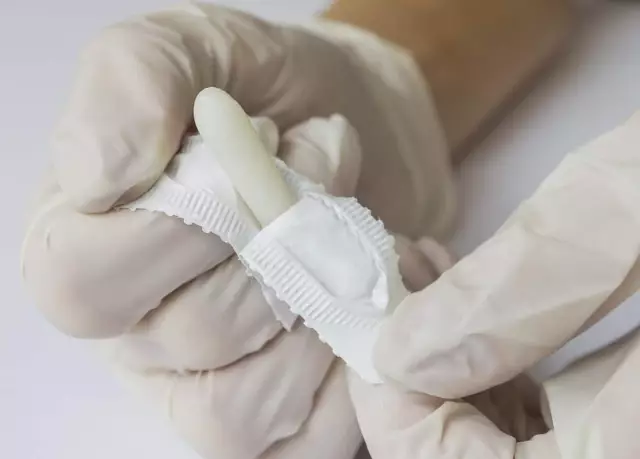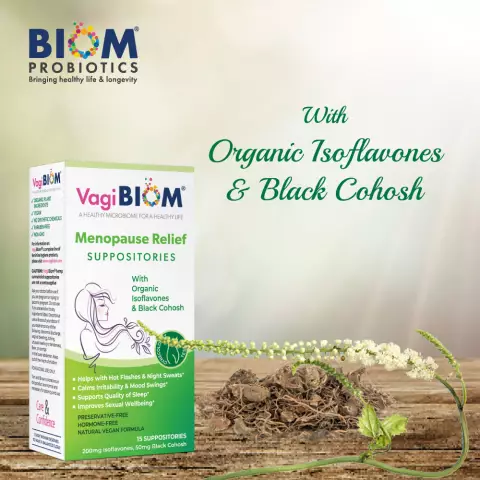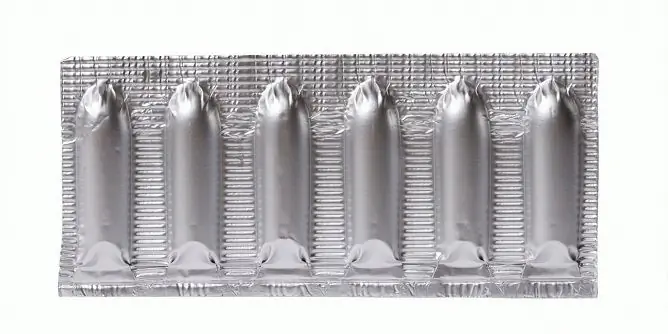- Author Rachel Wainwright wainwright@abchealthonline.com.
- Public 2023-12-15 07:39.
- Last modified 2025-11-02 20:14.
Natamycin
Natamycin: instructions for use and reviews
- 1. Release form and composition
- 2. Pharmacological properties
- 3. Indications for use
- 4. Contraindications
- 5. Method of application and dosage
- 6. Side effects
- 7. Overdose
- 8. Special instructions
- 9. Application during pregnancy and lactation
- 10. Use in childhood
- 11. Drug interactions
- 12. Analogs
- 13. Terms and conditions of storage
- 14. Terms of dispensing from pharmacies
- 15. Reviews
- 16. Prices in pharmacies
Latin name: Natamycin
ATX code: G01AA02
Active ingredient: natamycin (Natamycin)
Producer: LLC "Tula Pharmaceutical Factory" (Russia); JSC "AVVA RUS" (Russia)
Description and photo update: 09.10.2019

Natamycin is an antifungal drug for local use in gynecological practice.
Release form and composition
Natamycin is available in the following dosage forms:
- vaginal suppositories: torpedo-shaped, from light yellow to darker yellow with a light brown tint; there are no foreign inclusions; a funnel-shaped recess or an air rod inside the suppository is allowed (3 pcs. in blister packs, in a cardboard box 1 blister pack and instructions for medical use);
- cream for external and local use: uniform, from white to light yellow (5, 10, 15, 20, 25, 30, 35, 40, 50, 60, 70, 80, 90 or 100 g in polymer / glass cans or in aluminum / polymer tubes, in a cardboard box 1 can or 1 tube and instructions for the use of Natamycin).
Composition for 1 suppository:
- active substance: natamycin - 100 mg;
- auxiliary components: colloidal silicon dioxide, macrogol glyceryl hydroxystearate, solid fat Supposir AM.
Composition for 1 g of cream for external and local use:
- active substance: natamycin - 20 mg;
- auxiliary components: sodium lauryl sulfate, decyl oleate (Decyl oleate), cetostearyl alcohol, propyl parahydroxybenzoate, cetyl ether wax, methyl parahydroxybenzoate, propylene glycol, purified water.
Pharmacological properties
Pharmacodynamics
Natamycin is an antifungal polyene antibiotic of the macrolide group. Possesses a wide spectrum of fungicidal action. The death of microorganisms is due to the binding of the drug with sterols of cell membranes, as a result of which their integrity and functionality is disrupted.
Natamycin is active against the following microorganisms:
- pathogenic yeast-like fungi (especially Candida albicans);
- yeast (Rhodotorula and Torulopsis);
- other pathogenic fungi (Penicillium and Aspergillus).
The activity of the drug against dermatophytes (Epidermophyton, Microsporum and Trichophyton) is less pronounced.
In vitro, natamycin did not affect gram-negative and gram-positive bacteria. In clinical practice, resistance to the drug has not been found.
Pharmacokinetics
With local and external application, suppositories and cream are almost not absorbed through mucous membranes and intact skin and do not have a systemic effect.
Indications for use
Natamycin is used to treat fungal diseases of the mucous membranes and skin caused by pathogens sensitive to the drug, including the following infections: balanoposthitis, vulvitis and vulvovaginitis (caused mainly by fungi of the genus Candida).
In addition, cream for external and local use Natamycin is used in the treatment of dermatomycosis, candidiasis of nails and skin, as well as otitis externa caused by fungi or complicated by candidiasis.
Contraindications
The drug is contraindicated in case of hypersensitivity to the main or auxiliary components of suppositories or cream.
Natamycin, instructions for use: method and dosage
Vaginal suppositories
Suppositories Natamycin are intended for vaginal administration.
Candles previously released from packaging are inserted as deep as possible into the vagina, 1 pc. once a day (at night). For more convenient administration of the drug, the patient should be in the supine position.
For candidal vulvitis, vaginitis and vulvovaginitis, suppositories are used daily for 3-6 days.
The duration of the course is set individually. Treatment should be continued for several more days after the symptoms of the disease disappear. The introduction of vaginal suppositories Natamycin during menstrual bleeding is not interrupted.
Persistent vaginitis caused by Candida albicans requires additional systemic treatment. To sanitize the focus of fungal infection in the intestine, the patient is prescribed a tablet form of natamycin (1 tablet four times a day for 10-20 days).
Topical and topical cream
With balanoposthitis, vulvovaginitis and vulvitis, Natamycin cream is applied to the affected areas of the skin and mucous membranes one or more times a day. With the persistent course of diseases caused by the fungus Candida albicans, additional administration of natamycin in the form of suppositories or oral administration in the form of tablets is recommended.
For dermatomycosis (including diaper rash in children, candidiasis of nails and skin), the drug is applied to the affected surfaces from one to four times a day.
In patients with mycosis of the external auditory canal, the drug is applied to the affected surface (from one to four times a day). Before applying Natamycin cream, it is necessary to clean the ear, and after the procedure, place a turunda made of wool, cotton or other natural material in the ear canal.
The duration of the course is set individually. Treatment continues for some time after the symptoms of the disease disappear.
If the symptoms of the infection worsen or there is no improvement, you should consult your doctor to verify the diagnosis.
Side effects
The drug may cause a burning sensation and mild irritation at the site of the injection of suppositories or cream application.
Overdose
If you follow the instructions for use of the drug, an overdose is unlikely.
special instructions
After intravaginal administration of the drug, the suppositories under the influence of the patient's body temperature turn into a foamy mass. This contributes to a more even distribution of the active substance over the mucous membrane.
During the period of treatment with Natamycin in the form of suppositories, there is no need to exclude sexual intercourse, however, the partner should be examined for the presence of candidal infection, and if it is detected, appropriate treatment should be carried out. It is also necessary to use barrier methods of contraception (for example, condoms).
Influence on the ability to drive vehicles and complex mechanisms
The drug does not affect the ability to drive vehicles and operate other complex mechanisms.
Application during pregnancy and lactation
Natamycin is practically not absorbed from the skin or mucous membranes. It does not adversely affect the fetus, therefore its use during pregnancy and lactation is not contraindicated.
Pediatric use
The drug in the form of a cream can be administered to children, including newborns.
Drug interactions
Data on drug interactions of natamycin with other substances and drugs have not been reported to date.
Analogs
The analogues of Natamycin are Dafnedzhin, Ginofort, Zalain, Primafungin, Irunin, Kandibene, Pimafucin, Kandizol, Ekofutsin, etc.
Terms and conditions of storage
Store in a dark place, protected from moisture and out of reach of children, at a temperature not exceeding 25 ° C.
Shelf life: vaginal suppositories - 2 years; cream for external and local use - 4 years.
Terms of dispensing from pharmacies
Available without a prescription.
Reviews of Natamycin
There are very few reviews of Natamycin on thematic sites and forums. Patients are much more likely to share their experience of using other drugs, the active ingredient of which is also natamycin. In general, reviews of natamycin-containing suppositories and creams are positive. The funds are effective for thrush, do not cause irritation, are allowed for use during pregnancy and breastfeeding, and in the form of a cream - even in newborns.
Price for Natamycin in pharmacies
The actual price of Natamycin is unknown.
The cost of a similar drug, for example, Pimafucin, ranges from 340-380 rubles. (cream 2%, 30 g in a package) up to 250-265 rubles. (vaginal suppositories 100 mg, No. 3) or 480-500 rubles. (vaginal suppositories 100 mg, No. 6).

Anna Kozlova Medical journalist About the author
Education: Rostov State Medical University, specialty "General Medicine".
Information about the drug is generalized, provided for informational purposes only and does not replace the official instructions. Self-medication is hazardous to health!






